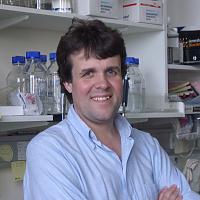
Dr Julian Sale
Position: Programme Leader
Personal home page:
http://www2.mrc-lmb.cam.ac.uk/groups/jes/
PubMed journal articles - click here
Dr Julian Sale is pleased to consider applications from prospective PhD students.
My lab is interested in the mechanisms that alleviate arrested DNA replication and the impact their loss has on mutagenesis and on the maintenance of epigenetic memory through the recycling of histones during replication. Replication can be arrested by DNA damage or by naturally occurring DNA secondary structures. We are particularly interested in translesion synthesis (TLS), which is mediated by specialised DNA polymerases and which is required for replication of both damaged bases and a particular secondary structure called the G quadruplex. Although TLS is potentially mutagenic it plays a critical role in normal cells and understanding its control is central to understanding cell transformation. We study these processes using the powerful combination of vertebrate somatic cell genetics coupled with biochemical, biophysical and advanced optical microscopy techniques to monitor the molecular choreography of proteins and DNA at sites of stalled replication.
DT40 gene targeting Single DNA molecule analysis of replication FRET Subnuclear deep UV irradiation (in progress) ChIP
Symplectic Elements feed provided by Research Information, University of Cambridge
Simpson, L.J. and Sale, J.E. (2003). REV1 is essential for DNA damage tolerance and non-templated immunoglobulin gene mutation in a vertebrate cell line. EMBO J. 22, 1654-1664. Edmunds, C.E., Simpson, L.J. and Sale, J.E. (2008). PCNA ubiquitination and REV1 define temporally distinct mechanisms for controlling translesion synthesis in the avian cell line DT40. Molecular Cell 30, 519-529. Sarkies, P., Reams, C., Simpson, L.J. and Sale J.E. (2010). Epigenetic instability due to defective replication of structured DNA. Molecular Cell 40, 703-713. Sarkies, P. & Sale, J.E. (2012). Epigenetic Stability and Cancer. Trends in Genetics 28, 118-127.















